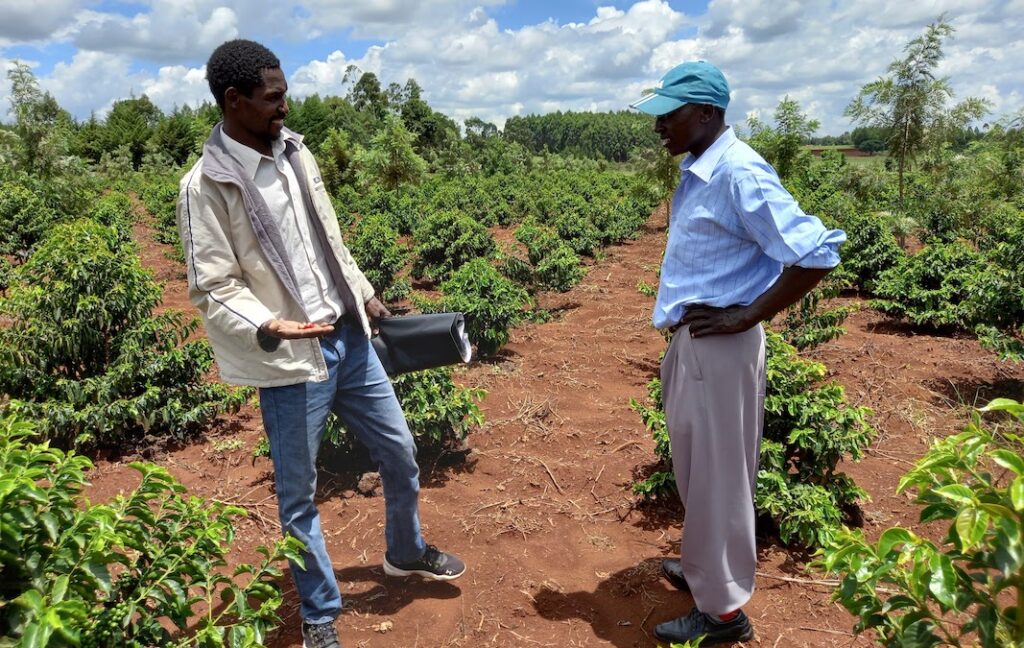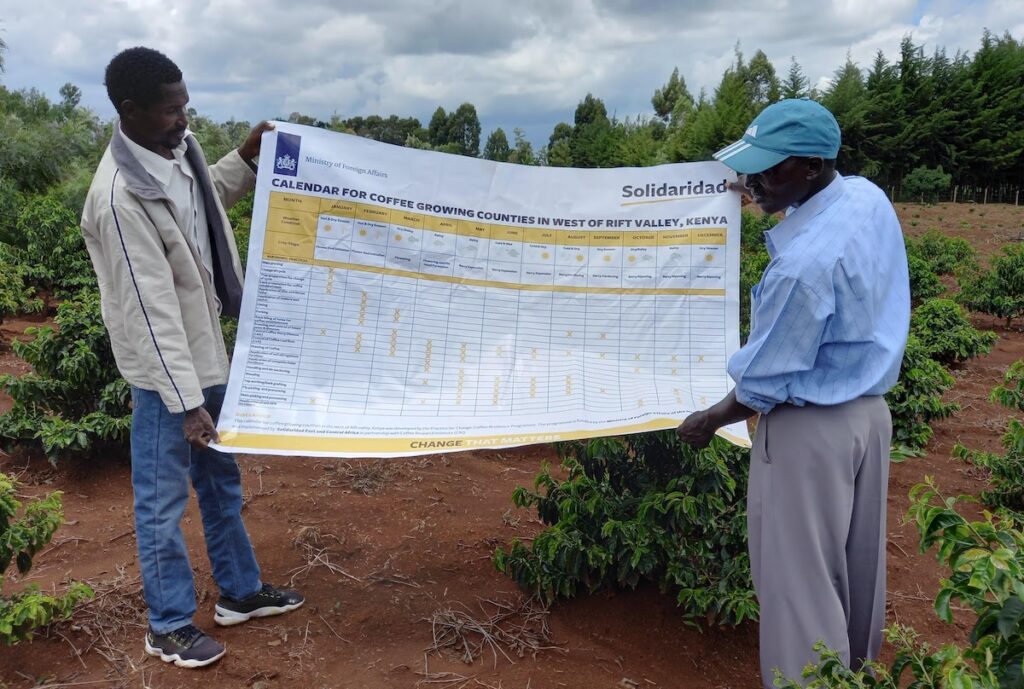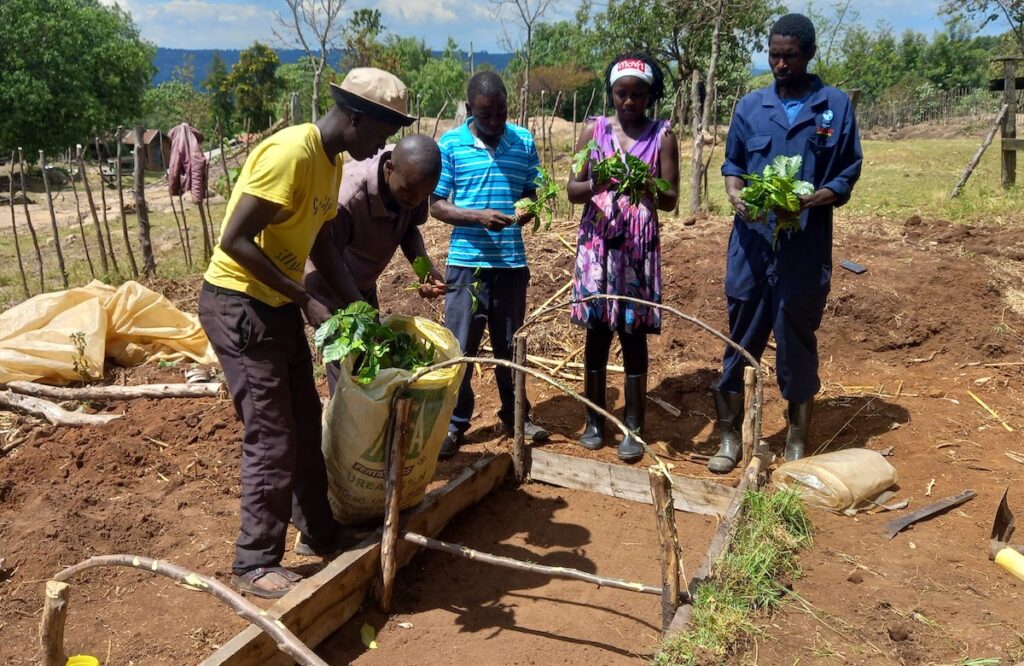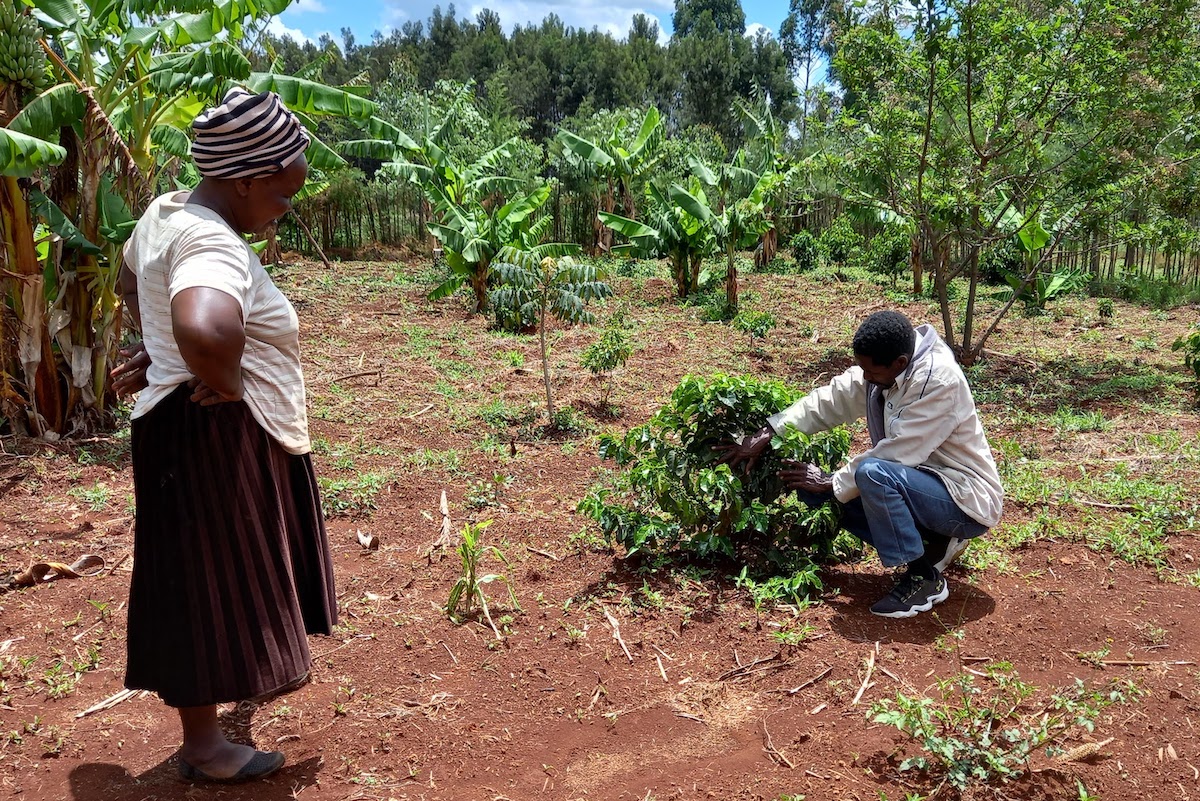Japheth Kipyegon (right) provides advice on pruning techniques to a woman coffee farmer in Kenya.
This is the story of how Japheth Kipyegon, a small-scale coffee farmer in Kenya, is building a sustainable and profitable coffee business in a difficult economic climate. Practice for Change: Coffee Resilience Programme (PfC Coffee), a joint initiative of Solidaridad – East and Central Africa and the Ministry of Foreign Affairs of the Netherlands, targets young people and women in Kenya, Tanzania and Uganda, to help new coffee farmers make their dreams come true.
Seeding a New ‘Crop’ of Coffee Farmers
Japheth Kipyegon, like many young people in Kenya, faced high unemployment rates and limited access to capital. More than 30 percent of Kenya’s work-eligible young people have no jobs. And with up to 1 million young people entering the job market every year, finding meaningful employment has become increasingly difficult.

The challenge was a lived experience for Japheth, who overcame difficulties to make his dream of a thriving coffee farm a reality. Given local conditions, he started his farm leasing small parcels of land and scraping to gather funds to buy coffee seedlings.
I started farming in 2020 on a 0.2 acre leased piece of land. At first, I planted 200 coffee seedlings. Later that year, I acquired additional land and expanded my farm with an additional 600 seedlings I bought from the County Government of Nandi subsidized seedlings programme.
Japheth Kipyegon
An opportunity for inclusive growth
Agriculture is an important pillar of Kenya’s economy. Directly and indirectly, it contributes up to 60 percent of the country’s Gross Domestic Product. However, agricultural productivity in the country, and throughout Africa, has been in decline and this is especially noticeable in the coffee sub-sector where production has dropped from 128,700 metric tonnes in the 1990’s to 34,500 metric tonnes in 2021. (Coffee Directorate).
Kenya’s agriculture sector, which is largely dominated by men, lacks opportunities for women and young people. However, the Kenyan government recognizes that bringing both women and youth into the coffee value chain is a vital tool in their effort to regain the country’s productivity in coffee.
Solidaridad’s PfC Coffee programme recognizes women and young people as participants and decision makers at both the household and cooperative levels. The programme helps farmers access land, and improve coffee production practices and income to improve lives.
Bringing Better Coffee Management Services Closer to the Community
Japheth joined Solidaridad’s PfC Coffee programme and received valuable training, including pest and disease management, proper harvesting, and sustainable fertilizer/manure application. He has realized progressive business growth as a coffee farmer and began to share his knowledge with others as an agricultural consultant. Some of his clients have even reported up to a 40 percent increase in coffee productivity and much lower costs of production.
Solidaridad equipped me with practical knowledge and skills in grafting, pruning, top working, and propagator and nursery management.
Japheth Kipyegon
Good Practices, Bountiful Harvest
To improve and encourage good practices through the programme, Solidaridad collaborated with the Coffee Research Institute of Kenya to train coffee farmers on the coffee calendar. Farmers especially benefited by developing an entrepreneurial mindset to think of coffee farming as a business.

For Japheth, the training has paid off. During the course of his first productive season in 2021, he harvested 600 kilograms of cherry from 200 coffee bushes; by 2022, his yield rose to 3,600 kilograms of cherry from 1,200 coffee bushes.
Empowering the Next Generation of Coffee Farmers
The PfC Coffee programme aims to show how coffee can be an attractive venture for a new generation of farmers, especially for women and young people. Throughout his coffee farming journey, Japheth has worked to persuade other young people to make the leap into coffee farming, and he has provided training to others in an effort to build a pool of local coffee experts.
Training other youth has created part-time employment opportunities and enabled us to meet the growing demand for pruning services. I am optimistic that we will persuade more youth to venture into coffee.
Japheth Kipyegon
Solidaridad’s PfC Coffee programme has a goal of increasing the participation of youth and women in farmer cooperatives by 10 percent, while also improving access to capacity building, and enhancing farming and business practices. Other trainings covered topics like climate awareness, smart agriculture, pruning, canopy management, manure application, water conservation, pests and disease management, as well as proper harvest and post-harvest processing.
Over 1,200 young people across Uganda, Tanzania and Kenya have participated in the programme between 2018 and 2022. In Kenya alone, the programme has reached 540 people.

Ensuring that young people, like Japheth, have access to the resources needed to make coffee more profitable and sustainable is a key priority for the government of Kenya and development partners, like Solidaridad. An inclusive supply chain allows young farmers to adopt technology and smart agricultural practices that help them contribute to reducing the country’s unemployment.
Beyond working with farmers in his community, Japheth has reached further to offer technical support and knowledge on good coffee agronomic practices – pruning, grafting, and spraying – via his Facebook page at Agripoa.

